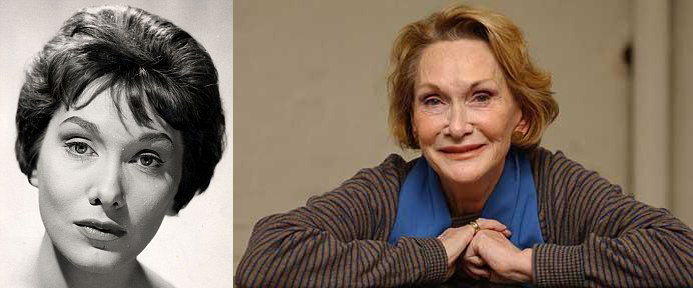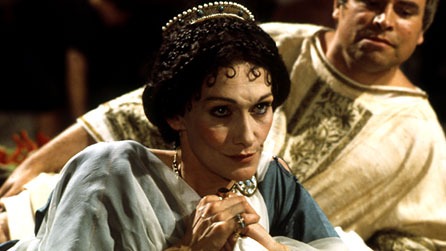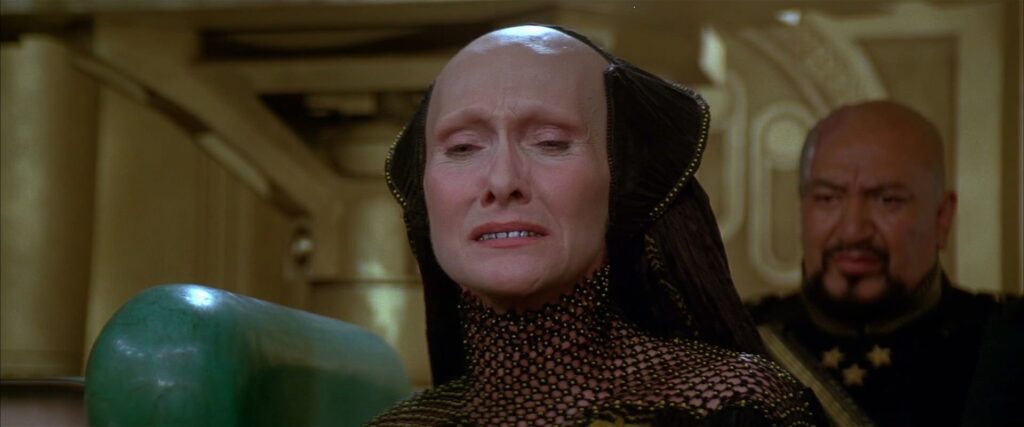Siân Phillips

WELSH-BORN stage and screen veteran Siân Phillips is forever identified on television as the mother/empress Livia in the classic BBC series I, Claudius (1976), for which she won a BAFTA-TV award, and on the big screen as the Reverend Mother in the science fiction epic film Dune (1984).
Her broad range of roles across a performing career spanning more than seven decades have varied wildly from endearing to downright deadly.
She was born Jane Elizabeth Ailwên Phillips in Gwaun cae Gurwen, Amman Valley, on May 14, 1933, to Sally (Thomas), a teacher, and David Phillips, a steelworker and policeman.
Brought up in a Welsh-speaking home – she learned English by listening to the radio – Phillips performed on the Home Service of BBC Radio in Wales at age 11, while at Pontardawe Grammar School, and won the speech-and-drama award for her performance at the National Eisteddfod held at Llandybie in 1944.
She toured extensively for the Arts Council in Wales in original Welsh plays and in translations from the English classics before becoming an award-winning television actress in her late teens.
Phillips, whose great aunt was Welsh evangelist Rosina Davies, attended the University of Wales and, after graduating, entered the Royal Academy of Dramatic Art with a scholarship in September 1955, the same year as Diana Rigg and Glenda Jackson. She made her London debut in the title role of Hedda Gabler in 1957.

After a brief marriage to Don Roy, a post-graduate student at the University of Wales, she met and married actor Peter O’Toole in 1959 and appeared frequently with him on stage, including Ride a Cock Horse (1965) and Man and Superman (1965), and in the movies Becket (1964), Goodbye, Mr Chips (1969) (which earned her a National Society of Film Critics award and a Golden Globe nomination for Supporting Actress), Murphy’s War (1971) and Under Milk Wood (1971). They had two daughters, actresses Kate O’Toole and Pat O’Toole.
While her resonant voice served her well as an announcer, newsreader and narrator at different stages of her career, her severely chiseled looks and arch, regal bearing entitled her to perform some of the more notable classics, with critically-acclaimed turns in Saint Joan, The Taming of the Shrew and The Duchess of Malfi, being just a few. Phillips’ occasional patricians have also graced such well-mounted films as Young Cassidy (1965), Nijinsky (1980) and The Age of Innocence (1993).
After 20 years of marriage, Phillips divorced O’Toole, known for his carousing and hard-living ways. The couple divorced in 1979, and Phillips wrote about this tempestuous period of her life in Public Places, the second volume of her autobiography.
She soon remarried, to a much younger actor, Britisher Robin Sachs, but they, too, would divorce in 1991.
Despite her personal turmoil, she continued to delve into her stage work, beginning a new phase of her career in musicals. Her participation in such productions as Pal Joey (her musical debut), Gigi and A Little Night Music ultimately led to her acclaimed one-woman cabaret show Marlene, a tribute to legendary Marlene Dietrich, which opened to rave reviews in London in 1997. Two years later, she won a Tony Award nomination for this role on Broadway.
After firmly establishing herself in I, Claudius during the mid 1970s, she distinguished herself regularly in such quality TV mini-series as Oresteia (1979), Crime and Punishment (1979), Tinker Tailor Soldier Spy (1979), Winston Churchill: The Wilderness Years (1981) (as Clementine Churchill), Smiley’s People (1982) (as Lady Smiley), The Two Mrs Grenvilles (1987) (as the Duchess of Windsor), A Killing on the Exchange (1987), The Snow Spider (1988), The Chestnut Soldier (1991), The Borrowers (1992) and its sequel The Return of the Borrowers (1993) (as Mrs. Driver) and Aristocrats (1999).

She has continued to work well into the new millennium with parts on stage including My Old Lady, Calendar Girls, Crossing Borders (a cabaret show), Les Liaisons Dangereuses, The Importance of Being Earnest, Playing for Time and Les Blancs, while in films she appeared in The Gigolos (2006), Love Song (2012), Miss Dalí (2018), Be Happy! (2019), Dream Horse (2020) and was the narrator and grandmother in a rather radical retelling and animated version of A Christmas Carol (2020).
However, Phillips’ career could have been over before it even began after a serious road accident left her in hospital needing reconstructive surgery to her face.
The surgery was a success and she went on to enjoy a long and impressive career on both stage and screen – but she has never forgotten how fortunate she was. “Looking back on my life, though, I was so lucky myself in getting my face sorted out that quickly … if you look very closely you can see very faint scars on my face but they are barely noticeable which is an ongoing testament to the surgeon’s skill.”
The experience of suffering facial disfigurement – even for a short time – left a deep impact on Phillips which was why she agreed to become a patron of RAFT (Restoration of Appearance and Function Trust), a charity which carries out pioneering research into techniques for helping those who have been affected by disfiguring illnesses or damage such as burns, wounds, limb amputations or skin cancer.
Phillips was awarded the CBE in 2000 and made a Dame Commander of the Order of the British Empire (DBE) in the 2016 New Year’s Honours list.
She served on the Welsh National Council and as a governor of the National Theatre of Wales, and received Wales’s highest theatrical honour – membership in the Honorary Order of Druids – in recognition of her services to Welsh drama.
In January 2018, Phillips was recognised for her career spanning more than 70 years at the BBC Audio Drama Awards and was given a Radio Lifetime Achievement Award.
She is a patron of the Bird College of Dance, Music & Theatre Performance, based in Sidcup, Greater London.
Her two volumes of autobiography – Private Faces and Public Places – were published in 1999 and 2001, respectively.
Since 2005, the British Academy of Film and Television Arts Cymru (BAFTA in Wales) has presented the Tlws Sian Phillips Award to a Welshman or woman who has made a significant contribution in either a major feature film or network television programme.
BACK TO HOME PAGE
